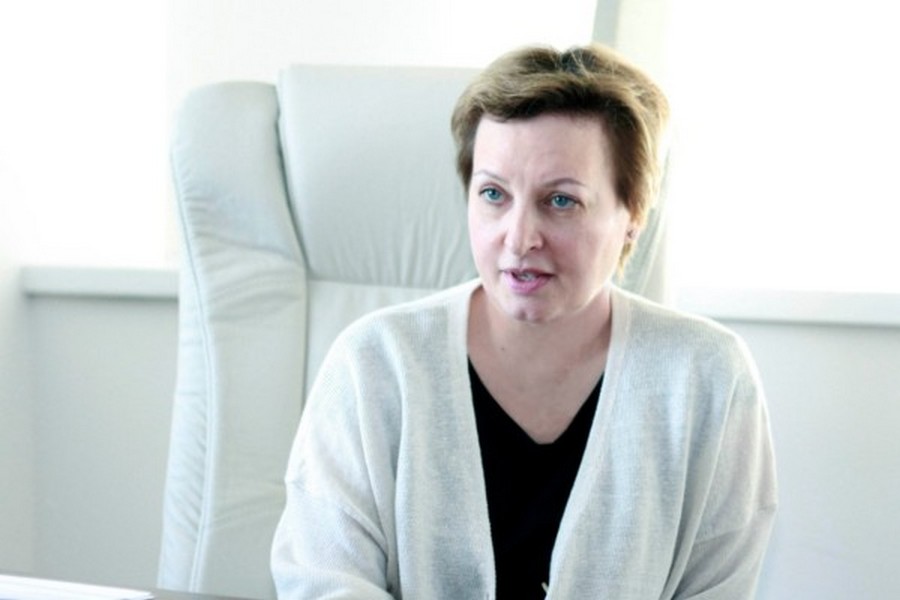Chairperson of the Council of the Association of Financiers of Kazakhstan Elena BAKHMUTOVA:
RESPONSIBLE TAXPAYERS AND DISCIPLINED BORROWERS ARE ENTITLED TO COUNT ON SUPPORT

In conditions of uncertainty of the crisis and post-crisis situation of the international economy, Kazakhstan took a number of important anti-crisis support measures during a state of emergency and a lockdown. Chairperson of the Council of the Association of Financiers of Kazakhstan Elena BAKHMUTOVA told Interfax-Kazakhstan how these measures impacted the country's financial market, what decisions should be taken in the future and what legislative changes should be made for phased transition to the economic growth.
- How did the Covid-19 pandemic and the global crisis situation affect Kazakhstan’s financial market as a whole? How prepared did Kazakhstan get for the crisis?
- This crisis is significantly different from all previous ones by nature since it did not begin with economic problems. There are differences in the response to the crisis that followed from the governments, central banks and financial regulators of the most countries. In the first place, I would note the speed of the response, as well as coordination of fiscal and monetary response measures, involvement in the development of anti-crisis measures of international institutions, including financial ones. Most of the measures were preventive. The actions of the Kazakh authorities were decisive and systemic in response to the pandemic. Without awaiting the signs of a sharp slowdown in the economy, a number of preventive measures were taken. If one looks at statistics, according to the Ministry of National Economy, the decline in GDP was 0.2% for 4 months. The average per capita income and average monthly wage for the first quarter increased by 4% in real terms. According to bank statements , profit is growing, the NPL rate has changed slightly. That is, it would seem that so far no catastrophic changes have occurred. However, very soon, forced measures to freeze economic activity will manifest themselves and affect economic indicators. Therefore, it is necessary to act proactively in order to nip all crisis phenomena in the bud.
At the same time, this is not the first crisis for Kazakhstan’s economy. Both business and the financial sector have already experienced difficult times. Therefore, the reaction is more reasonable. An understanding is deeper of how to act, what should be done on the part of banks and business, and what kind of support is needed from the state. Such readiness means a lot, as well as rapidity and coordination of actions of the government, business and financial regulators. If one objectively look at the situation, Kazakhstan is much better prepared for the current crisis than in 2008-2009. First, in those days there was not enough experience of anti-crisis response in the financial sector, the country had a significant external debt, especially the banking sector’s external debt and a “bursting bubble” in the real estate market. Currently the situation in the banking sector is much more transparent and stable, the external debt of banks is not high. By international standards, Kazakhstan’s state debt is at a moderate level - 25.5% of GDP, including 9.6% external debt only. There is still a possibility to carry out, if necessary, additional borrowing to finance the budget deficit, but understandable provided that the debt level and its service costs are curbed.
As for the current budget expenditures, then, as follows from the principles of countercyclical budget policy, budget expenditures did not shrink during the crisis, but on the contrary spending on the employment assistance program, infrastructure projects, especially on the construction of roads and water pipelines increased in order to meet demand and save jobs. Expenditures on government business support programs increased, especially in the key areas - subsidies and guarantees.
Kazakhstan’s anti-crisis plan is almost equal to 4% of GDP. This is comparable to the expenses of developed countries and has been made possible thanks to the presence of an “airbag” in the form of gold and foreign exchange reserves and assets of the National Fund, the total amount of which is $ 89 billion, according to S&P’s estimates.
In addition to fiscal incentives, in order to maintain stability of the banking sector and prop up the level of lending to the economy as part of a countercyclical approach, the financial regulator took measures to ease certain regulatory measures aimed at relaxing the requirements for creating reserves, weighing assets depending on risk levels and some others. An additional package of measures is expected that will concern the standards regarding the size of capital buffers, the liquidity coverage ratio (LCR) and the net stable funding ratio (NCFR) calculation.
These measures are in line with international practice: the most central banks in America and Europe have also taken measures to disband some of capital buffers, that is, part of the reserves that banks were able to release to support among other things lending to the economy. In addition, a number of more tightened regulatory requirements for Basel 3 were postponed until 2023. According to the most notorious standard IFRS 9, which was especially sensitive for Kazakhstan’s second-tier banks during the external independent asset quality review (AQR), the approach was made more flexible, allowing each national regulator to advise banks how they should handle the assessment of expected loan losses, depending on the situation in a particular country.
In turn, since the state of emergency in the country Kazakhstan’s second-tier banks has provided a deferral of 3 months for servicing loans to almost 45% of small and medium-sized businesses (SMEs) from across the industries most affected by the lockdown, as well as about 40% of consumer loan individual borrowers.
- How could a possible extension of the pandemic and a recession affect Kazakhstan’s financial sector in the future?
- So far, measures are aimed at curbing problems. This is typical for most countries. Monetary and financial regulators act as if they are awaiting a deep fall and equally a rapid recovery. However, experts are trying to make a reservation that forecasts will be revised in the event of a repeat outbreak of the epidemic. If there is another outbreak of the disease with the introduction of a stringent lockdown for several months, then the situation will be simply unpredictable. The picture of not so rapid global economic recovery, and in particular in Kazakhstan, looks more realistic. In this scenario, most sectors of the economy would suffer, employment, household incomes would decrease, solvent demand would drop and supply decrease. In such circumstances, the standing of the majority of borrowers would inevitably worsen, which would lead to further payment deferrals, bank income losses and their cost would increase for creating provisions on non-performing loans.
The financial sector, in particular banks, will also need systematic support measures, as they acted as a buffer for credit deferrals and took a big hit. The total amount of deferrals provided by banks on loan repayments to SMEs and individuals has already neared 460 billion tenge, that is, second-tier banks lacked this amount of cash flow in the second quarter. Further massive deferrals on loans can no longer be secured only by loosening regulatory standards without harming financial stability of the banking sector. Therefore, further measures to support business entities should be well-balanced given compensation for losses to all parties. Life will go on after the recession, the banks need to continue to operate and service the economy, and for that they are required to maintain the necessary stock of capital and liquidity.
- During the state of emergency and lockdown, bank deferrals were provided to SMEs and individuals in their support, which are already terminating on June 15. In your opinion, what further steps are needed to improve their standing?
- As I said SMEs and individuals received deferrals totaling 460 billion tenge. As for individuals, about 40% of borrowers received deferrals, or nearly 1.9 million individuals. Almost 45% of the SMEs loan portfolio has been identified as imoacted and prone to very high risks.
In my opinion, some borrowers from among SMEs and, possibly, individuals are very likely to need additional deferrals. In the case of business, there should be a concrete analysis of borrowers’ financial standing in order to assess ther ability to function further. If they are viable and need only a longer loan repayment period then it is reasonable to provide restructuring of loans taking into account a real turnover.
Some of SMEs will inevitably prove to be unviable, that’s reality. Hereto supporting inefficient companies through fiscal measures or renewed loan prolongations will be imprudent and costly. This would be a waste of resources created by bona fide taxpayers. That is, now it will be necessary to evaluate the real ability of borrowers to get out of the “freeze”, which depends on the macroeconomic situation, and on the segments in which this or that enterprise operates, as well as on the ability of management or owners to manage business. First of all, bona fide business participants, who mantained employment, paid taxes, social security contributions and loans should be supported and motivated.
Hereto it is not necessary to consider that only SMEs with loans should be supported. If one looks at the number of SMEs, including individual entrepreneurs, there are approximately 1.3 million active small business enterprises. If we exclude private entrepreneurs, this is some sort of 300,000 SMEs, only 30,000 of them have bank loans . That is, it turns out that there is about 10% of SMEs that have bank loans. Therefore, when we talk about how to solve the problems of SMEs, and we think that they are solved through banks, we are generally mistaken, since the main segment of SMEs - almost 90% - do not use bank loans. This means that in relation to them there is also another support package, including public procurement, support for cooperatives, and a search for sales markets. In addition to support that was provided by banks in terrms of deferrals, non-charging fines and penalties, a package of fiscal measures was provided, in particular, in terms of tax deferrals and exemption. I believe that fiscal measures and loan deferrals could be furter applied but exclusively to those who have proved in the past to be a bona fide taxpayer and a disciplined borrower.
Support tools are sufficient within the framework of state programs, they should be used comprehensively. At the exit stage, refinancing and new soft loans for working capital at the expense of additional liquidity provided by the National Bank under a soft loan program, as well as expanding support in the form of guarantees by development institutions under the Business Road Map - 2025 and Economics of Simple Things state programs will be required. It is also possible to provide special interest-free loans for SMEs to save jobs during the recovery period.
- On June 8, the National Bank of Kazakhstan intends to revise the base rate, which is now at 9.5%. Given uncertainty, is it worth taking measures to cut it?
- Most central banks relaxed monetary policy. If at the beginning of the crisis in Kazakhstan, a very conservative estimate was made for inflation rates of 9-11%, then taking into account the first results upon easing lockdown measures, the assessment softened, and the head of the National Bank said that inflation was expected to be at 6-8%. Moreover, after the tenge sharp depreciation it is now strengthening. To some extent, the inflation shock was absorbed by artificial consumption slowdown being under lockdown. This means that more decisive action could be expected in oder to lower the base rate from 9.5% to stimulate business activity.
- Since Kazakhstan is very dependent on oil prices, according to your estimates, what situation will be in the oil markets? How will this affect the economy of the republic?
- Oil prices depend on the depth and duration of the recession of the global economy and the speed of getting out of it, as well as on the impact of ongoing trade wars despite the pandemic. To this end, Kazakhstan directly depends how quickly the global GDP and trade relations will recover as a whole. In my opinion, no quick recovery should be expected, but most experts predict a balance between demand for oil and Brent crude price of $ 30-33 per barrel by the end of this year. The forecast for 2021is higher - up to $ 46-50 per barrel. Based on these forecasts, one can assume that Kazakhstan will be able to return to GDP pre-crisis levels no earlier than in the second half of 2021 - this is according to an optimistic assessment, given the rapid exit from the global recession and that there will be no new lockdown.
- What suggestions do you have to improve the legislation and new tools in the financial market?
- At the legislative level, more preparations for the post-crisis recovery are now needed. Today we should already think about what we will do in order to restore the economic growth. The most important thing here is structural reforms as a whole, which impact the structure of the economy, a serious revision of social and budgetary policies. The government presence in the economy is justified during the crisis. For the post-crisis development, the state must return to its classical regulatory functions and not be present as a market player. The abundance of state government programs should be a thing of the past - a full restoration of market tools in the financial market is necessary, support in the form of guarantees and subsidies can only be provided pointwise for agriculture and priority sectors that have a significant impact on changes in the structure of the economy.
Now the issue is under scrutiny on how to use distressed assets in economic turnover based on market principles, some of which are concentrated in banks, and some in the Fund of Problem Loans. This requires the securitization mechanism reset. However, it will only work in the liquid stock market conditions. In addition, it is necessary to increase the effectiveness of the development institutions, which will use market-based risk sharing tools with private lenders. For example, syndicated lending, with Development Bank of Kazakhstan (DBK), as the main development institution, acting together with second tier banks for lending to large investment projects based on market conditions. This may require a series of legislative changes.
I stress that measures must be taken to hand over pension assets under private management. This will be a signal for transition to a market principle. Then there will be an opportunity to increase the interest of investors in managing their assets, including through the opportunity to use some of pension savings to purchase homes through the housing savings system. This package of legislative measures, I think, in no case must be put off.
In my opinion, it is also necessary to get back to the package of regulatory and legislative measures that would help increase the stock market liquidity, the interests of both issuers and investors in raising funds from the market.
As for consumer lending, a lot of strict norms have already been passed. If an individual is sufficiently informed about the risk and has basic financial knowledge, then s/he must independently assess their capabilities and make a decision to get a loan. However, given the inadequate levels of financial education, it is necessary to further improve the customer rights protection system in financial services and help enhanse financial literacy.
After the crisis, we will all be at a different level of awareness in the field of digital products and services. Therefore, the legislation in the field of digitalization should stimulate their appearance in all areas, taking into account the new risk limitation, including personal data protection.
Crisis times provide for an opportunity to take a fresh look at routine issues and within a short period of time implement what it would take years in normal times. It is important not to miss out on these opportunities.
- Thank you for the interview!
June, 2020
© 2025 Interfax-Kazakhstan news agency
Copying and use of these materials without reference to the source is prohibited
Archive






